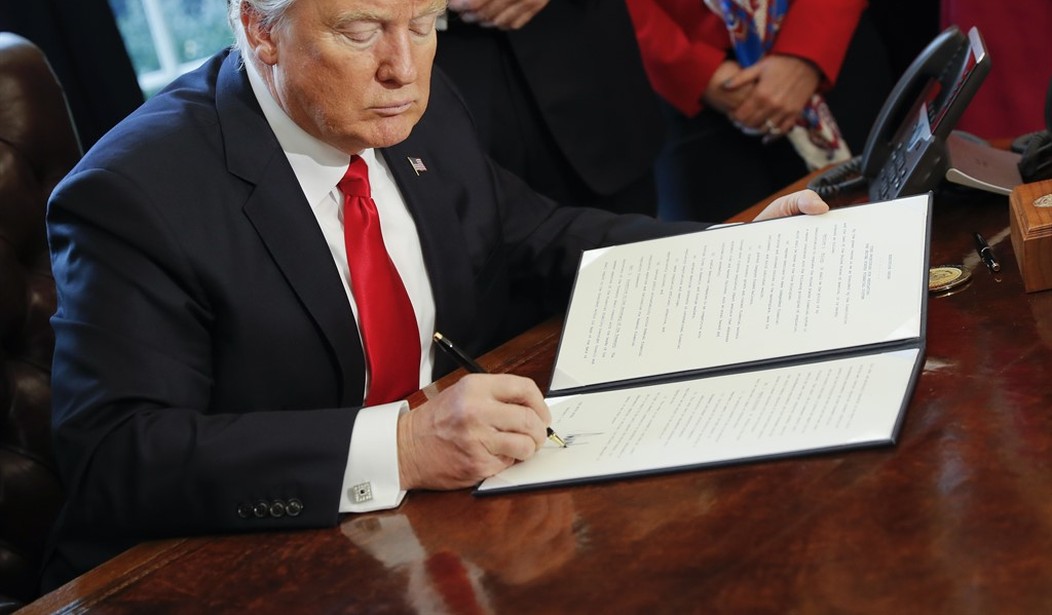“If I could paraphrase a well-known statement by Will Rogers that he never met a man he didn't like,” President Reagan once quipped, “I'm afraid we have some people around here who never met a tax they didn't like.”
Instead of “tax,” he could just as easily have said “regulation.”
Consider the reaction to our new president’s determination to cut regulations by 75 percent. “Trump’s unpopular deregulation agenda will permit corporations to rip off consumers, poison our environment, cheat and mistreat workers, and more,” wrote Public Citizen, a liberal non-profit group, predicting “disastrous consequences” would follow.
They and other pro-regulation groups often accuse conservatives of counting only the costs of regulations and none of the benefits. This charge might resonate a bit more if they didn’t do the opposite and act as if cost wasn’t even an issue.
Unfortunately, our economy is awash in regulations. “There is virtually no aspect of our lives over which laws and ordinances do not reign,” regulation expert Diane Katz writes. “Congress and federal bureaucrats routinely ignore regulatory costs, exaggerate benefits, and breach legislative and constitutional boundaries.”
According to independent estimates, regulat
Add in the regulatory burdens imposed during the last Bush administration, and the annual cost of red tape has increased by at least $200 billion in the past 15 years.
Recommended
The cost to taxpayers of government administering all that red tape is high. Fiscal year 2017 figures put it at $70 billion, an amount that has almost doubled since 2000. Much of that increase is what we pay the regulators, all 279,000 of them.
Put another way, we’re paying regulators plenty to enforce regulations that cost us more than ever.
With good reason did President Trump say that his deregulation agenda is intended to “remove the anchor that’s weighing us down.”
That anchor has been growing for a long time. Prior to World War II, notes Washington Post columnist Robert Samuelson, regulations were confined mainly to a few large industries, such as railroads, banks, and the electric and phone utilities.
“Now regulation is pervasive,” he writes. “It touches air and water pollution, pensions, vehicle fuel efficiency, the Internet (“net neutrality” rules), home mortgages, political campaign contributions . . . and much more.”
And there’s no end in sight. As the Competitive Enterprise points out, in fiscal 2015, the Federal Register (which lists final and recommended rules) totaled 80,260 pages.
Given not only the size of the regulatory state, but the exponential pace of its growth, who can really blame the president for wanting to cut regulation “massively”?
And, as Katz points out, the problem goes beyond the number and cost of regulation. The problem also lies with the approach.
“Conventional wisdom has long held that government controls of industry are the best and only way to protect the public,” she writes. “We now know better. Forty years of command-and-control regimes have led to massive, ineffective, and unaccountable bureaucracies.”
There are several steps the Trump administration can take. One is to rescind the numerous executive orders President Obama issued to sidestep Congress, especially on labor, immigration and environmental issues.
Another is to review all pending litigation and designate cases for settlement, including challenges to President Obama’s Clean Power Plan; his transgender bathroom directive; and the Environmental Protection Agency’s egregious waters of the U.S. rule, which affects property rights.
“If you have 10,000 regulations, you destroy all respect for the law,” Winston Churchill once said. Well, we have a lot more than 10,000 these days. It’s high time we restored respect for the law -- and began taming our out-of-control regulatory state.

























Join the conversation as a VIP Member